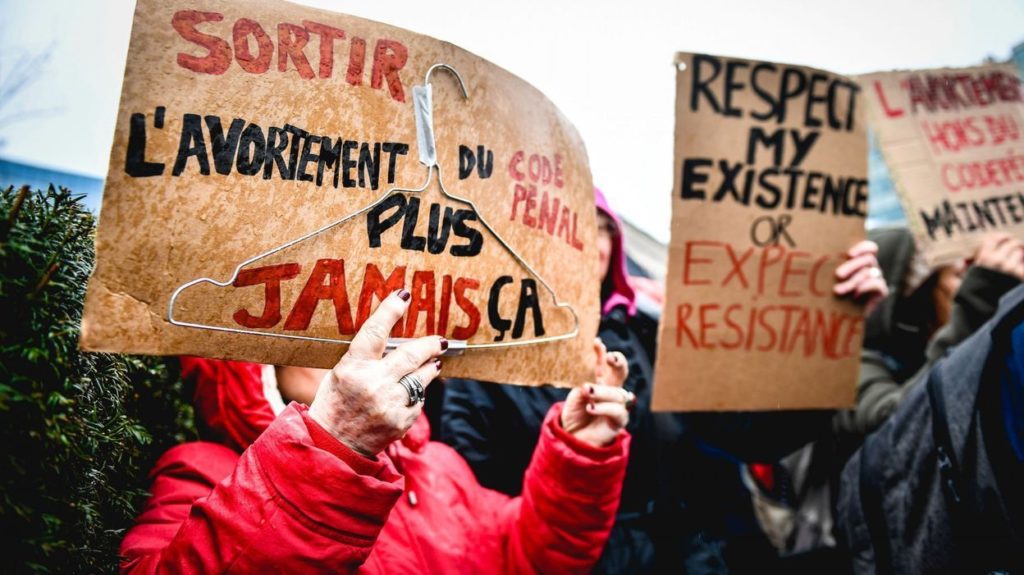Women's rights advocates will have all eyes on the Belgian parliament on Thursday, as an abortion rights bill is voted on amid concerns that some parties will yield to political pressures and let the bill fall through.
If passed, the bill would decriminalise abortion and relax the rules conditioning women's access to it, updating Belgium's abortion laws for the first time since 1990, in what supporters see as a "fundamental" step to protect women's rights to self-determination.
After opposition attempts to block it were dismissed in court, the much-anticipated vote will take place on Thursday afternoon amid rife inter-party tensions — prompting advocates to warn that the bill risked falling through if the Flemish and Francophone liberals yielded to the opposition.
"It's fundamental for women, we have to allow them to be the ones who decide whether or not to go through a pregnancy, it's fundamental," MP Éliane Tillieux, a leading sponsor of the bill, said on radio on Thursday.
A central amendment would be a six-week extension to the current abortion timeframe, which would allow pregnancy terminations to take place up until the 18th week of gestation, up from the current 12-week window.
Related News
- The decriminalisation of abortion is one step closer in Belgium
- Time frame for abortion likely to extend from 12 to 18 weeks in Belgium
- Changes to Belgian abortion law can go ahead, says Council of State
It would also reduce from six days to 48 hours the so-called "reflection" period, a mandatory delay imposed on abortion-seekers between their first medical appointment and the day of the abortion.
Further, the bill would take abortion out of the Belgian penal code, effectively doing away with the theoretical possibility of bringing criminal charges against a medical practitioner for performing an abortion.
"We want to make it possible, for women who learn that they are pregnant around the 12th week, to act on it, instead of sending them to a foreign country where they don't know the language, the hospitals, the procedures..." Tillieux said.
The bill came after reports that between 500 and 1,000 women in Belgium travelled abroad for an abortion after having gone past the Belgian 12-week limit.
Catherine Fonck, an MP for the Christian centre-right CDH, which opposes the bill, said the changes "went too far" and that extending the abortion time frame risked seeing a surge gender-based abortions.
"With [pre-natal tests] available from 12 weeks, [a foetus'] sex will certainly be at the basis of abortion requests," Fonck tweeted as the bill moved through the chambers last November.
Vote dragged into political 'blackmail'
In a plenary session, the Chamber will vote on the bill at 2:30 PM after the Council of State, Belgium's top administrative court, dismissed an attempt by opposing parties to block the vote from going forward after an initial approval in previous readings.
"Today, with the go-ahead from the Council of State, we are ready to move forward with the vote," Tillieux said, stressing that supporting MPs needed to take a clear stance on the issue and not give in to political "blackmail."
While the bill has received the support of eight parties on both sides of the language border, Tillieux, a member of the Francophone Parti Socialiste, said the result of the bill would largely hinge on the voices of the Francophone and Flemish liberal parties.
But ahead of the vote, the leader of the Flemish liberal party Open Vld, Vincent Van Quickenborne, said that the bill risked "further complicating" the ongoing coalition negotiations and that his party was favourable to pushing back the vote, Paris Match reports.
"Today, we will see which parties really wish to support progress in terms of women's emancipation," she said, adding that issue should be "independent" of any tit-for-tats in coalition negotiations.
"It's time for all parties who previously gave their support to the bill to vote favourably for it," Tillieux. "It is clear that the liberals support the text, but it's no use to abstain in the vote. They previously expressed support for another bill on culture but ended up abstaining."
The bill is firmly opposed by the Flemish nationalist Nieuwe Vlaamse Alliantie (N-VA), the far-right Vlaams Belang and the centre-right, Christian CD&V and CDH parties, who Tillieux accused of "clearly blackmailing" other parties for their support in the coalition talks.
Tillieux specifically called out both liberal parties, who are currently ruling in a minority coalition with the CD&V, urging "each liberal MP" to back the bill.
"If it falls through, it will be pushed back again and, today, there are women who need this law," she said.
Gabriela Galindo
The Brussels Times

